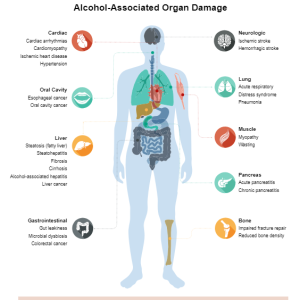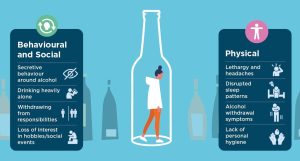The battle against alcohol addiction is a deeply personal yet universally challenging endeavor.
 Drawing from the insightful research of Foluke Adeosun, a medical sociologist from Afe Babalola University; and Emeka W. Dumbili, an Assistant Professor at University College Dublin, this guide synthesizes expert sociological and public health perspectives.
Drawing from the insightful research of Foluke Adeosun, a medical sociologist from Afe Babalola University; and Emeka W. Dumbili, an Assistant Professor at University College Dublin, this guide synthesizes expert sociological and public health perspectives.
It offers practical strategies grounded in a comprehensive understanding of the cultural, social, and individual aspects of alcohol addiction. This guide aims to empower individuals with actionable steps, fostering resilience and strength in the journey towards sobriety and healthier living.

Acknowledging the problem
The first critical step in overcoming addiction is acknowledgment. This involves confronting the truth about your dependency on alcohol. It’s not just about admitting that you drink too much, but also recognizing the harmful impacts it has on your health, relationships, and daily functioning.
Reflect on the reasons behind your drinking – is it stress, social pressure, or a means of escape? This self-awareness is fundamental to the journey ahead.
Understanding cultural and social influences
Adeosun and Dumbili’s research brings to light the significant role of cultural and social factors in alcohol consumption. Be mindful of how your environment, including societal norms, peer groups, and even family dynamics, may influence your drinking habits.
Identifying these factors can help you understand your addiction in a broader context and develop strategies to counteract these influences.
 Seek professional help; build support system
Seek professional help; build support system
Recovery is rarely a solitary journey. Engaging with addiction specialists, therapists, or counselors can provide you with the professional guidance needed.
Additionally, joining groups where you can share experiences and learn from others in similar situations can be incredibly beneficial. These networks not only offer emotional support but also practical advice and encouragement.
Making lifestyle changes
Substitute your drinking habits with healthier activities and hobbies. If you used to spend evenings drinking, consider joining a sports club, taking up an art class, or volunteering. These activities not only occupy your time and distract you from cravings but also contribute positively to your mental and physical well-being.
Educational empowerment
Educate yourself about the dangers and effects of alcohol addiction. This can involve reading literature, watching documentaries, or attending workshops. Knowledge is power – the more you understand about the nature of addiction and its consequences, the better equipped you are to combat it.
 Avoiding triggers and temptations
Avoiding triggers and temptations
One of the most critical aspects of overcoming alcohol addiction is identifying and avoiding triggers. Consider the example of Emeka whose primary trigger was his routine of visiting a bar in Lagos with friends after work, a social habit that consistently led to excessive drinking.
To combat this, he needed to restructure his post-work routine and develop practical strategies to avoid this trigger.
Change of routine: Emeka could start by altering his post-work activities. Instead of heading to the bar, he could plan alternative activities that are relaxing and fulfilling. This could be as simple as going for a jog, catching a late movie, or heading straight home to engage in a hobby.
Open communication: It’s important for Emeka to communicate his goals to his friends. By being open about his journey to sobriety, he could either gain their support or understand the need to distance himself from those who encourage his drinking habits.
Find new social circles: Emeka could join clubs or groups that align with his interests but do not involve alcohol. This could be a sports team, a book club, or a community service group. Engaging with people who share similar interests but do not center their socializing around alcohol can provide a supportive environment.
Seek alternative relaxation methods: Instead of using alcohol as a means to unwind, Emeka could explore other relaxation techniques like meditation, or listening to music. These activities can reduce stress without the negative consequences of alcohol.
Develop a response plan: Emeka should have a plan for when he is invited to the bar. This could include having a polite but firm refusal ready, or suggesting an alternative activity that doesn’t involve drinking.
Reflect on the benefits: Keeping in mind the positive aspects of not drinking, like better health, clearer thinking, and improved relationships, can help Emeka stay motivated when faced with temptations.
Utilize support networks: On days when the temptation is particularly strong, reaching out to a support network can be crucial. Whether it’s a quick call to a friend, a family member, or a member of a support group, talking through the urge to drink can be incredibly effective.
Through these practical steps, Emeka, and others in similar situations, can successfully navigate around their triggers, reducing the likelihood of relapse and steadily moving towards lasting sobriety.
 Developing coping strategies
Developing coping strategies
Equip yourself with healthy coping mechanisms for stress and emotional discomfort, which are often triggers for drinking.
Techniques like mindfulness, meditation, yoga, or simply going for a walk can be effective. Don’t hesitate to lean on your support system during tough times.
 Celebrating milestones
Celebrating milestones
Recognize and celebrate each milestone in your journey to sobriety, no matter how small. Whether it’s a day, a week, or a month without alcohol, acknowledging these achievements can provide a sense of accomplishment and motivate you to continue.
Conclusion
Overcoming alcohol addiction is a challenging yet achievable journey. It requires a blend of self-awareness, support, lifestyle adjustments, and resilience.
By acknowledging the problem, understanding the influence of societal factors, seeking help, and adopting healthier habits, you pave the way to a more fulfilling, alcohol-free life. Remember, every step taken, no matter how small, is a progressive move towards lasting change and recovery.


